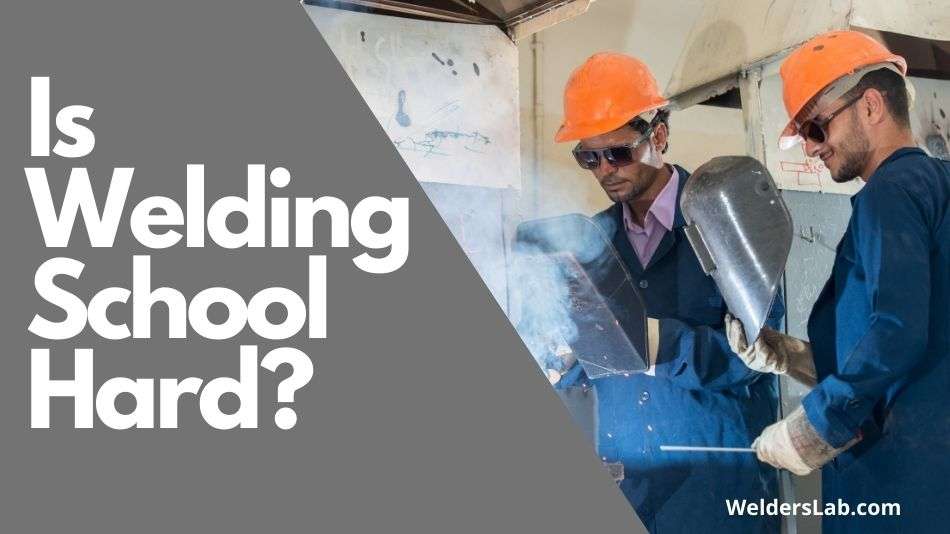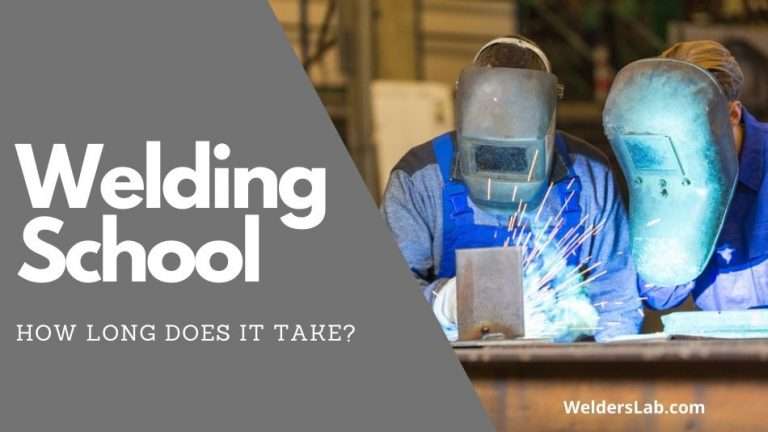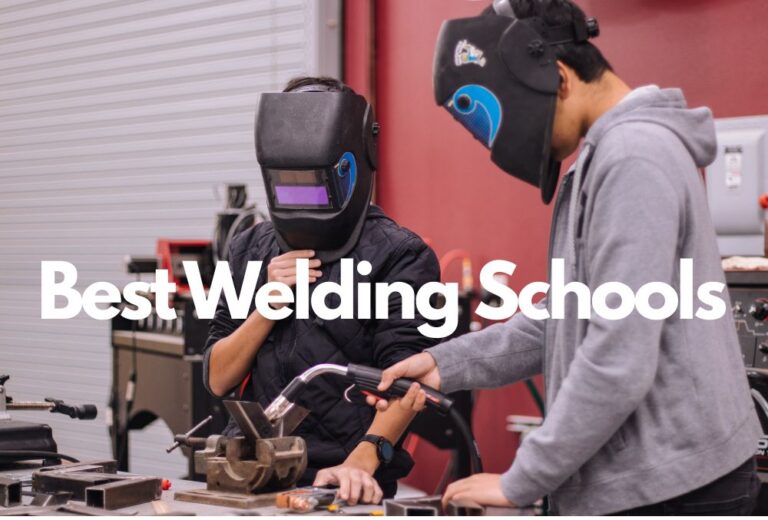Is Welding School Hard? 9 Things to Know Before You Start

As you consider your career path, I’m sure one of the things that will cross your mind will be how hard the training is and how long it will take. On average, an associate’s degree takes about 2 years to complete. Welding school does not take that long, and it’s not nearly as intensive if you ask me.
Is welding school hard? Welding school can be hard if you’ve never done it before, but any experience you have will help. At welding school, you will have to learn the various types of weld joints, welding positions, the different types of welding from MIG, Stick, and TIG, and the different welding occupations from structural, pipe, to underwater welding.
The real question you should ask is whether or not welding school is worth it. I think that’s where you can truly get some value and inspiration to help you determine whether or not you want to pursue welding school. There’s really a lot to consider here.
In this guide, we will answer the question of whether welding school is hard. I have 7 things that you need to know before you jump into welding school. By the time we’re finished here, you might have more than 7 tips, but hey, you will be plenty prepared for good welding times ahead!
Let’s get started, shall we?
Is Welding School Hard? An Inside Look
Here’s the thing. What do you define as hard? If you look at the dictionary, hard has a couple of different meanings. Of course, there’s the definition for hard being firm or solid, but that’s not really the context we’re talking about here. The definition we are going to review is “requiring a great deal of effort or strength”.
Everyone considers different things and different activities or actions to be hard. In welding school, you won’t spend hours poring over math, science, and history books. Welding school lasts approximately 8 months, depending on the program. The majority of those 8 months is hands-on training.
Yes, you will probably have to study codes and regulations as well as instructions on how to do things, but you will also have to spend a certain number of hours working in the shop and practicing the techniques you learn.
Welding school is a wholly different environment. It’s considered a technical program, so while you will have some studying and learning to do, you will have far more hands-on requirements where you get to weld and learn techniques and such as well.
Follow me with these 7 things you need to know, and you will soon have your own answer as to whether welding school is difficult and whether welding school is worth it.
4 Things You Can Expect to Do at Welding School
In determining whether or not welding school is difficult, it would be helpful to know just what you’re going to be doing, right? We’ve already told you there is a lot of hands-on work involved, but that doesn’t tell you the activities and things you will learn.
Let’s start there.
#1 Learn Basic Types of Welding Joints
If you’re going to welding school, they’re going to teach you the basics. One of the first things you will learn is about welding joints. There are 5 basic welding joints, which are defined by the American Welding Society.
These joints are:
- Butt joint
- Corner joint
- Edge joint
- Lap joint
- Tee joint
You will learn how to define each of these joints and how to work with them. You will also learn the techniques for making solid joints.
Making joints and understanding joints will include measurements and working with angles and degrees. You will have to be able to create a seam and anticipate the proper measurements. It’s a bit of geometry, and you will have to be able to do calculations for most welding needs, particularly joints.
These calculations are somewhat straightforward. Once you know the formulas or how to calculate a specific item, you can take that knowledge forward and apply it to whatever you are doing at the time.
#2 Different Types of Welding
In welding school, you will learn the major types of welding. You will learn techniques and basic practices for the four major welding processes.
- Stick welding (SMAW)
- TIG or gas tungsten arc welding (GTAW)
- MIG or Gas metal arc welding (GMAW)
- Flux core arc welding
These are the most prominent types of welding, and welding schools will teach you the basics of each type. You might decide that you prefer one type over the other and then use that as your go-to, but it will be useful to be familiar with all of them.
Gas welding is the foundation for every welding process, and understanding how to work with gas and manipulate gas for your jobs will be important.
Different jobs require different types of welding. If you’re attending welding school, you may not know yet where you’re going to land as far as welding jobs go. It’s worth the time and effort to be familiar with each of these welding types so that you can operate in multiple realms functionally.
They teach you about each of these because it’s important to know and understand each welding type. It might come in handy on certain jobs where a TIG weld just isn’t going to cut it, so you have to do a stick weld.
Don’t fool yourself into believing that you won’t need to know the basics of every type of welding because you do. The more you know, the more valuable you are in the industry. Some welding schools might focus more heavily on one welding type, but a good welding school will teach you all of them.
#3 Positioning and Technique
When you picture welding, you probably picture standing over a workbench comfortably with all of your safety gear on and no elements that will affect your weld. I mean, you see the welding pictures. They’re always standing at a workbench with a helmet and an apron while the sparks fly.
Here’s the thing – that’s not realistic. Sure, you will probably spend some time welding like that. Some welders will always weld in that environment. But the truth of the matter is that you could be welding in a tight space, you could be welding on your back, or you could be welding outdoors.
This is perhaps one of the things that many welders never consider and train for. Welding school should teach you about positioning and technique. Truthfully, many of these things you will learn in the field, but welding school can teach you the basics of determining an appropriate approach and position for various welding situations.
#4 Safety
One of the most important things you can learn at welding school is what proper safety equipment is and how to use it appropriately.
I can’t tell you how often I see welders not wearing a respirator when they are working with dangerous fume metals. I see many welders work without gloves or an apron. Safety is important, and I’m not just talking about the safety of today while you’re on the job; I’m talking about the safety of your health for the future as well.
Understanding what personal protective equipment is required according to the American Welding Society guidelines is incredibly important. Don’t be careless or think that you’re too cool to protect yourself.
Personal protective equipment is required for many jobs and is recommended for all jobs. Get yourself properly protected. You will learn about what safety equipment you need and when you should use when.
Static safety equipment that will most likely be required for welding school is the following.
- Jacket or sleeves
- Apron or chaps
- Boots (probably steel-toe)
- Welding cap
- Safety glasses
- Welding helmet
- Welding gloves
Be sure to check the requirements for the school you are considering, as these requirements can vary and some are very specific in brand and other details.
5 Tips for Attending Welding School
Ok, so you’ve made up your mind and you’re going for it. What can you expect while attending welding school? Is welding school difficult?
All welding schools are going to be difficult in their own way. There will be challenges, and you will have to adapt. A lot of schools will train you in a booth, but some schools train you out in the field, so you see what life as a welder might really be like.
I recommend that you determine which type of program will be effective for you. Do you think training in a booth will sufficiently prepare you for welding in the real world, or do you need a more life-like hands-on approach?
All welding schools are hands-on, but some treat schooling much like you might see on a welding job. Some welding schools have a static program where you learn in a controlled environment. Furthermore, some schools mix up the program and start you in a controlled environment, but also take you out in the field for realistic training.
Here are some tips for choosing and attending welding school.
#1 Choose Your School Wisely
I mentioned already that some schools are far more intuitive than others in their programs. You can read any number of reviews and see training videos that talk about how important it is to be taught in the field.
Choose your welding school wisely. Take a look at the program and how it works. You might even want to tour the program and have some meetings with the instructors to get a feel for the program. You won’t learn how to weld sitting in a classroom.
In fact, you won’t sufficiently learn how to weld just by practicing at a booth for 8 months either. Learning techniques and having time to hone and practice your skills are important. I am not negating the welding schools that teach you in a booth. These schools give you the chance to get to know your tools and the processes.
Learning in a controlled environment while you get the hang of the process can absolutely be a practical approach. But, I also think it’s very important to learn real-world situations. If you only learn in a controlled environment at a booth, you will be in for a rude awakening when you’re working outside somewhere.
The best welding school will give you some basic training in a controlled environment and then take you out in the field to practice in a realistic setting. You will experience what it’s like to move your gear and set up your gear and then work in whatever the setting may be.
I think I’ve painted a pretty clear picture here on the value of getting a real-world education when it comes to choosing a welding school.
#2 Get the Knowledge You Want
The thing is, there are so many welding industries and so many welding programs, you have to choose what’s right for you. Here is my advice on ensuring you are going to get the knowledge and perhaps the certification that you really want.
If you’re interested in pipeline welding, then be sure that the welding school you are attending will teach pipeline welding. There are some very specific welding programs, and there are welding programs that essentially teach primarily the basics of welding.
Then, there are welding programs that work in a little bit of everything. Peruse your options and look at your choices. Be sure to choose a welding school that will cover the appropriate material for the type of welding that you’re interested in working with.
A good example is aerospace welding. There are typically specific welding programs at schools that you can attend to learn what you need to know for aerospace welding, and even potentially earn a certificate for aerospace welding.
#3 Math Plays a Part
I know I told you that you won’t be sitting behind a desk studying history, science, and math. I meant that, but math really does play a part in the scheme of things. You will use geometry and trigonometry every day in welding school and in a welding career.
You will learn that both geometry and trigonometry play an integral part in your work. You will be measuring angles, forming joints, calculating lengths, and more. That’s where these come in. The difference here is that you’re learning how to do these calculations with actual objects.
Most welders have the type of brain function that works well with these types of calculations. It’s not algebra or calculus, but rather it’s related to shapes, angles, and measurements.
Don’t let the math part completely scare you away. This may be one of the parts that make welding school hard for you, and that’s ok. Be willing to learn the logic of these calculations and the formulas, and you will make it just fine.
#4 Practice Makes Perfect
If you’re going to pursue a welding career and attend welding school, be willing to put in the work. You need to be willing to practice.
Your skills and your advancement will steadily rely on your ability to practice. Most welding schools offer open shop hours, and there will be time within your classes to practice the skills you’re working on at the time.
Take advantage of available practice time. The better you get with your skills, the more valuable you are in the industry. There are certain forms of welding that simply require practice to be good at. Your strength will rely on your practice.
#5 Be Ready to Learn
Don’t just jump into welding because you don’t really know what else to do with your life. Yes, it’s a good career choice, but welding school will be hard. It will have challenges, and those challenges will be worse if you’re not in the proper mindset to learn and advance.
Welding school is designed to teach you how to be successful in the industry. If you’re going to take the time and effort to go to welding school, be ready to get your hands dirty and learn so that you will be successful and build your welding knowledge.
Do You Need Welding School to be a Welder?
In short, the answer is no. You don’t have to go to welding school to be a welder. But it can certainly be helpful.
You can get many welding jobs straight out of high school. However, it is far more advantageous for you to attend welding school and seek certification. It is absolutely not required, but it absolutely cannot hurt either.
You can go either way. You can even start out welding and then attend welding school to better yourself and grow. Maybe you decide later on that you want certification. That’s great! You can attend welding school whenever you are ready or skip it altogether.
Conclusion
Welding school is not for everyone, much like a welding career is not for everyone. Welding school is not required, but it’s a great way to learn the basics and to get certifications that can serve you well in the future.
Welding school can be hard but it can also lead to a rewarding career that will last the rest of your life.


